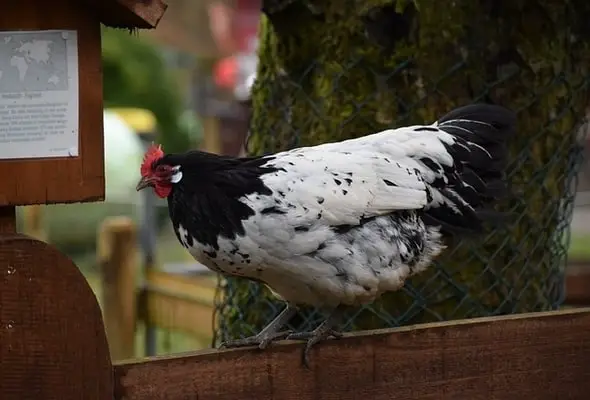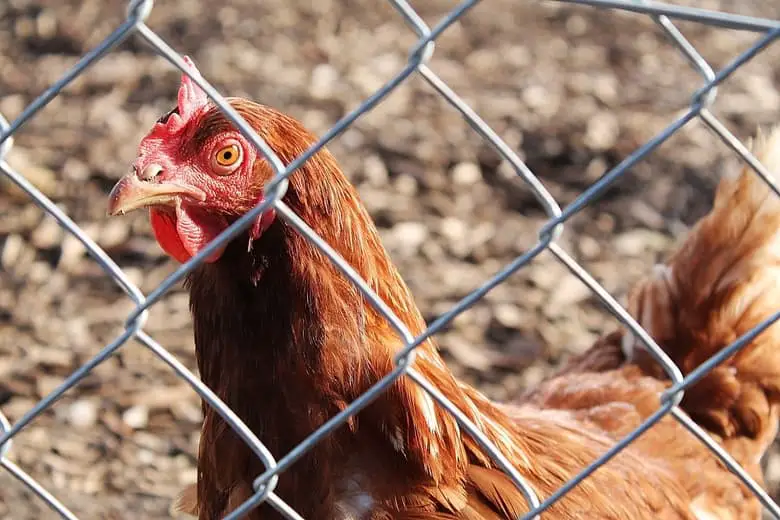The question of whether or not chickens can fly is a common one; are they flightless like penguins or can they naturally soar like an eagle? The answer is somewhere in the middle: most domestic chickens are heavy and have difficulty flying, though they technically can.
In addition to that, for the most part chickens are disinclined to leave the safety of an enclosed fence, so most domesticated chickens are not likely to fly away.
Regardless of a chicken’s ability to fly, most find it less-than-comfortable and cannot fly great distances or over any significant heights. So, can chickens fly over fences? How can you keep them safe?
Can Chickens Fly Over Fences?
Chickens can and will fly over fences and garden walls. Chickens are easily startled by loud noises, other animals, or sudden movements, and might decide it’s worth it to jump over a wall or fence if they think it’s safer, even if that puts your pet somewhere you would rather they not go.
There are several ways to keep your chickens safe, even from themselves. Some fences and encampments are better than others, as some are taller or are enclosed, so considering your local environment is the first step in choosing the best coop.
You can also clip your chickens’ wings to prevent them from traveling around. In addition to enclosures and trimming their wings, it’s important to maintain a healthy and happy living environment to dissuade your chickens from trying to escape. If they feel they are safest where they are, they are less likely to try and escape when startled or scared.
What Fence is Best to Keep Chickens?
There are a few different and effective ways to keep chickens from flying over a fence. Perhaps the most obvious choice is to build a bigger fence.
Chickens aren’t built to fly high and far: they peak at about ten feet, though most can’t reach more than four or five feet, and usually don’t fly further than about forty or fifty feet at a time. A ten to twelve foot fence will keep pretty much any domestic chicken in its pen, no matter how much it tries to escape.
Some places restrict how tall you can build fences and enclosures, so having a tall fence is not always an option available to everyone. Another option is adding mesh, wire, or other covering to a shorter fence.
Any amount of covering will dissuade your chickens from trying to get out of their enclosure since they won’t want to get trapped by the fencing. A third option is getting a chicken coop run enclosure. A run enclosure is an outdoor space that is enclosed or fenced in, usually with a small interior coop as well.
Run enclosures allow your chickens to experience all the perks of outdoor living, like running and exploring without invading other chickens’ territory in the brood, and the safety of an interior coop, somewhere for them to nest down and sleep comfortably — the best of both worlds.
Chicken runs do tend to require more maintenance than normal coops and can be quite a bit more expensive than other options.
They also take up more space than other chicken enclosures, but most chicken runs include nest boxes and roosts, which make for a more fulfilled living environment than a coop with no outdoor space or one lacking a roost.
Can I Stop My Chickens From Jumping the Fence?
Another option to keep your chickens from jumping over your fences is to try wing clipping. Wing clipping prevents your chickens from flying off and also helps maintain harmony within the brood. Wing clipping is simple, harmless, and super helpful for raising chickens.

To clip your chickens’ wings, spread the feathers and trim only the primary wings. It isn’t necessary to clip both wings, as trimming one will prevent the chicken from flying off. Unlike declawing cats, wing clipping is completely painless for your pets.
Different breeds of chickens have different flying capabilities and younger chicks, even of heavier breeds, are more inclined to fly away or explore outside of their enclosures, so it is a good idea to have additional means of maintaining your chickens.
Especially if you live around dogs, foxes, or other predators, your chickens will likely be more skittish and likely to try and jump over your fences.
What Are Bad Enclosures For Your Chickens?
Not all enclosures are made the same, some are not at all suited to keeping your pets. The most important aspects of a coop to consider are the safety and comfort of the inhabitants.

Not only do chickens make for easy prey for many predators, but they are also delicate creatures who can become ill if they feel unsafe or stressed. Building an improper coop makes it harder, and in some ways, impossible to keep your chickens.
If the slats are too far apart or if the coop is not properly insulated or ventilated, your chickens will almost certainly get sick.
A coop should include a roost, a nesting box, a scratching area, and a dust bath. Chickens also like sunbathing and appreciate places to hide and shelter. They should be wide and deep and have at least three feet of ventilation, and even more in hotter weather.
In cold weather it is important to insulate the coop for your birds. Depending on the size of your brood, you will need a larger enclosure so that your chickens don’t become overcrowded.
Conclusion
Chickens can be fun and loving pets. They are not considered the easiest pets to care for — not only because of their delicate constitutions but also due to their skittishness and need for specific care conditions. But if you have the right environment for the chickens, they can be very rewarding and caring pets to keep.
Chickens can fly over a fence that is too small or not properly enclosed, so doing research and building the best coop for your chickens is key to raising healthy and happy birds. Tall fences, mesh or wire coverings, or a chicken run are all great options when considering raising chickens.

